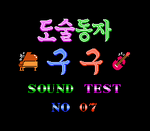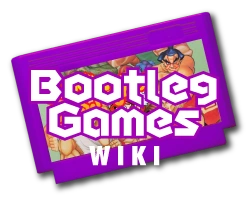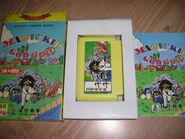(this page needs to be rewritten.) Tags: Visual edit apiedit |
(→Trivia) Tags: Visual edit apiedit |
||
| Line 24: | Line 24: | ||
== Trivia == |
== Trivia == |
||
* The game includes a sound test option accessible through the title screen. It contains all the music tracks used, which is a feature present only in a few unlicensed games aside from this one. |
* The game includes a sound test option accessible through the title screen. It contains all the music tracks used, which is a feature present only in a few unlicensed games aside from this one. |
||
| − | * The game will |
+ | * The game will reward the player with more lives if he gets the EXTRA letters in order. Three if he get them all on the same stage or else two. |
* [[Zemina]] started to work on the Famicom in August 1991. It took them to figure out on how to develop for the console and make the necessary tools. Googoo's developpment ended on May 5 1992. |
* [[Zemina]] started to work on the Famicom in August 1991. It took them to figure out on how to develop for the console and make the necessary tools. Googoo's developpment ended on May 5 1992. |
||
* The game was reviewed in GameWorld 6 and 7 in 1992, a korean gaming magazine. |
* The game was reviewed in GameWorld 6 and 7 in 1992, a korean gaming magazine. |
||
Revision as of 09:44, 24 June 2017
Magic Kid Googoo (Hangul: 도술동자 구구, Dosuldongja Googoo) is a Korean unlicensed platform game developed by Zemina in 1992 for the Famicom. From Zemina's history of games they released, this is the only game for the aforementioned console.
Overview

In this game, the main character is a kid named Googoo (who seems to be wearing a karate uniform) and its attack ability consists on lifting rocks and throwing them at enemies or pots that contain items such as magic capsules, money (called as "food") or a letter (if the player collects all the letters to form the word EXTRA, an extra life is rewarded). By pressing select Googoo can use special powers or turn into other temporary characters (the latter consumes magic pills). "Food" is collected through the levels or by playing the bonus minigames, and it includes an item shop as well, accessible after quitting from a minigame. The game contains 7 worlds, each of them with a boss after a temple level and a password to access directly. Passwords for each world are the following:
- World 1: MAGIC
- World 2: TIGER
- World 3: ORGAN
- World 4: STICK
- World 5: BOARD
- World 6: EAGLE
- World 7: MOUTH
Trivia
- The game includes a sound test option accessible through the title screen. It contains all the music tracks used, which is a feature present only in a few unlicensed games aside from this one.
- The game will reward the player with more lives if he gets the EXTRA letters in order. Three if he get them all on the same stage or else two.
- Zemina started to work on the Famicom in August 1991. It took them to figure out on how to develop for the console and make the necessary tools. Googoo's developpment ended on May 5 1992.
- The game was reviewed in GameWorld 6 and 7 in 1992, a korean gaming magazine.

Sound test screen
- Another interesting title screen option is a staff screen. Some of the developers shown parted ways to found Open Corp. and are also shown in the credits for Koko Adventure, which uses the same HUD from this game but simplified. One of the developer stated that Koko was the spiritual successor to Magic Kid Googoo.
- The sound engine is based off Tiny Toon Adventures by Konami, which was later used in Open Corp.'s Famicom games.
- Twin Mouse, developped by Open Corp and released around 1994 has all of the music based on ones from Magic Kid Googoo.
Gallery
| List of games by Zemina |
|---|
|

